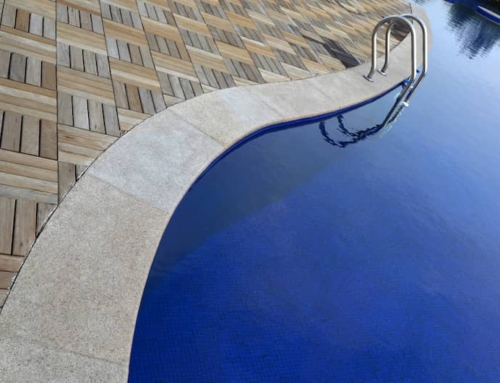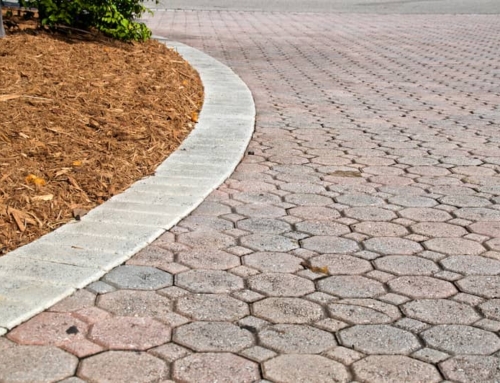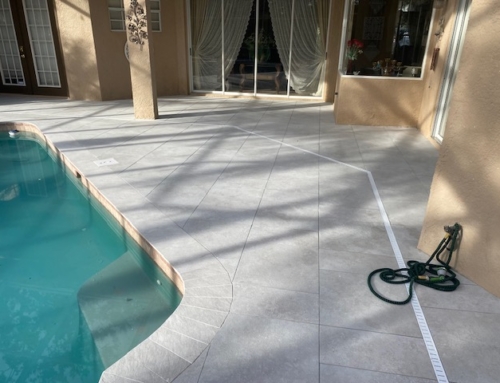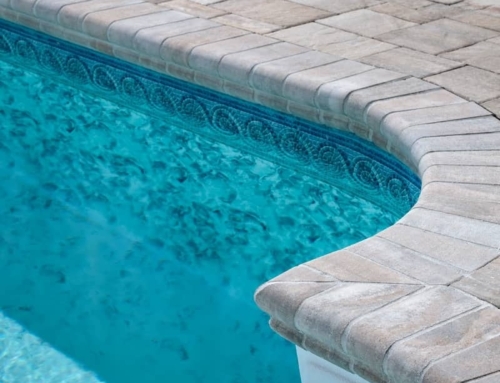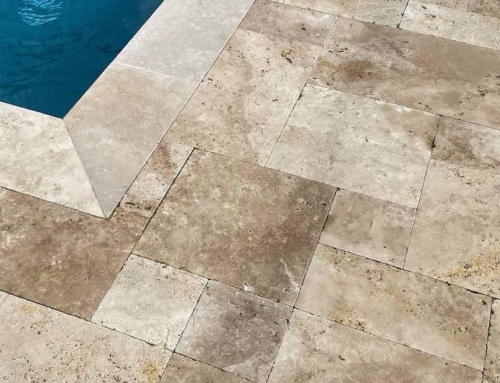Understanding the importance of sealing your pool deck pavers is crucial for maintaining your outdoor living spaces’ aesthetic appeal and durability. Pool decks crafted from concrete pavers or natural stone not only elevate the beauty of your patio but also enhance your overall outdoor experience. However, these porous materials can absorb stains and succumb to weed growth, making sealing pavers a necessary step in paver installation.
Applying a quality sealant forms a protective barrier against UV rays, moisture, and foot traffic, significantly extending the life of your paver patio. Whether you prefer a wet look, semi-gloss finish, or matte finish, choosing the right paver sealer can also refine the color of your pavers, giving them a vibrant appearance year-round.
By sealing your pavers, you protect them from fading, staining, and efflorescence and ensure easier maintenance, preventing damage and preserving the durable beauty of your driveway, walkway, or patio.
So, let’s dive in and learn why and how to keep your outdoor spaces impeccable with the proper sealing process.
Why Seal Pool Deck Pavers?
Do pavers need to be sealed? You may be pondering this question as you look over your pool deck. The answer is a resounding yes, and here’s why:
Protection against Weather Elements and Chemical Exposure
Sealing your pool deck pavers protects against the harsh elements and chemicals that come with pool maintenance. A seal coat helps prevent water absorption, which can lead to freeze-thaw damage in colder climates. It also provides added protection against chlorine and salt, which can erode the surface of concrete pavers over time.
Prevention of Mold, Mildew, and Algae Growth
The damp environment around pools is a breeding ground for unsightly and potentially slippery mold, mildew, and algae. Applying a paver sealant creates a barrier that makes it harder for these organisms to cling to the pavers, keeping your deck clean and safe.
Enhancing Safety with Non-Slip Surfaces
Safety is paramount around pool areas. Sealed pavers can be treated with non-slip additives to maintain traction even when wet. It is crucial in preventing slips and falls, making sealing pavers essential in ensuring your family’s and guests’ well-being.
Preserving Aesthetic Appeal and Property Value
Besides the practical benefits, sealing your pavers can significantly enhance their appearance. Sealants can bring out the natural color of your pavers, giving them a glossy finish or a wet look that many homeowners desire. It not only boosts your home’s curb appeal but can also contribute to maintaining or even increasing your property’s value.
The decision to seal your pool deck pavers is about more than just maintaining appearances. It’s a practical choice for protection, safety, and long-term investment in your property.
Knowing the importance of a pool deck pavers’ sealer doesn’t stop at the decision to apply it; choosing the right type is crucial for the longevity and aesthetics of your outdoor space. The suitable sealer protects and enhances the beauty of your patio pavers.
Types of Sealers: Penetrating vs. Topical Sealers
Penetrating Sealers: These seep into the paver surface, bonding with the material internally to provide robust protection against dirt, moisture, and stains without altering the appearance. It is ideal for preserving the natural look.
Topical Sealers: Form a defensive coating on top of the pavers, offering a glossy finish that can enhance the color. However, they may require more frequent reapplication.
Considerations for a Wet Look vs. Natural Finish
Choosing between a wet look and a natural finish depends on your design preference and the material of your pavers:
Wet Look: Amplifies the color and texture, giving pavers a saturated appearance as if wet.
Natural Finish: Maintains the paver’s original hue and texture, offering protection without the sheen.
Importance of Non-Slip Features in Sealers
For pool decks, the non-slip feature is non-negotiable due to safety concerns:
- Look for sealers specifically designed for pool areas, which include additives to prevent slips on wet surfaces.
- Regularly check and reseal to maintain the non-slip surface, especially in high foot traffic areas.
Selecting the proper sealer balances functional needs and aesthetic desires, ensuring your pool deck remains safe, beautiful, and durable for years.
Professional Paver Sealing vs. DIY: What You Need to Know
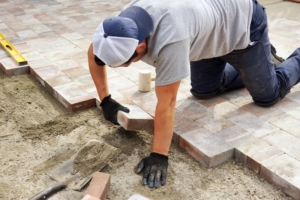
Deciding between professional paver sealing and a DIY approach requires understanding the scope and complexity of the task at hand:
- Complexity of the Area: Properly applying jointing sand becomes crucial if your pool deck has intricate patterns or hard-to-reach areas. A professional can guarantee thorough coverage of jointing sand without damaging surrounding plants or features, maintaining the interlocking integrity of the pavers while preventing displacement or weed growth through the gaps.
- Condition of pavers: Existing damage, like cracks or fading, might need expert assessment to ensure proper sealing and repair.
- Type of sealant: Choosing the right sealant for your concrete paver can be daunting. Professionals have the expertise to select the best option to enhance color and protect your pavers from fading.
Opting for professional sealing services offers long-term benefits. Experts in paver sealing ensure a uniform application, preventing common DIY mistakes like uneven coverage or excess sealant, which can lead to pooling or a slippery surface.
Professionals also bring efficiency and precision, often completing the job more quickly and with better results, extending the years of your pavers and maintaining their appearance with less frequent need for resealing. This level of detail not only preserves the aesthetic appeal of your paver surface but also safeguards your investment in your outdoor living space.
Maintenance Tips for Sealed Pool Deck Pavers
Maintaining your sealed pool deck pavers is essential to ensure their longevity and visual appeal. Here are several factors and tips to keep them in top condition:
- Regular Cleaning: Debris and dirt can accumulate on your paver surface, dulling its appearance. Regular sweeping and occasional washing with mild soap can prevent buildup and maintain the enhancing color of your pavers.
- Inspection Routines: Periodically check for signs of wear, such as fading or joint sand erosion. Addressing these issues promptly can prevent more significant problems.
When it comes to resealing:
- Frequency: Pavers typically need to be resealed every 3 to 5 years , but this varies depending on your area’s seasonal conditions and the level of foot traffic.
- Visual Cues: Look for fading color or diminished sheen as indicators that it’s time to apply sealant again.
- Performance Check: If water no longer beads on the surface, it might be time to seal pavers with a new coat.
By adhering to these maintenance practices, you can ensure your pool deck remains a vibrant and safe component of your outdoor living space.
Enhancing Your Pool Deck’s Safety and Aesthetics through Sealing

Sealing your pool deck pavers is pivotal for creating a safe and visually appealing swimming haven. This process augments the beauty of your pool area and fortifies the surface against slips, stains, and weather damage. Regular maintenance, coupled with the expertise of Creative Resurfacing Solutions in pool deck resurfacing, can ensure your space remains an inviting and secure oasis. Embrace the peace of mind with a well-preserved outdoor space, where every splash and sunbath is a joy.

